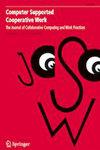Data as Relation: Ontological Trouble in the Data-Driven Public Administration
IF 2.3
3区 计算机科学
Q3 COMPUTER SCIENCE, INTERDISCIPLINARY APPLICATIONS
Computer Supported Cooperative Work-The Journal of Collaborative Computing
Pub Date : 2023-09-30
DOI:10.1007/s10606-023-09480-9
引用次数: 0
Abstract
Abstract This paper examines how the intense focus on data in political digitalization strategies takes effect in practice in a Danish municipality. Building on an ethnographic study of data-driven management, the paper argues that one of the effects of making data a driver for organizational decision-making is uncertainty as to what data are and can be taken to mean. While in political discourse and strategies, data are considered as a resource for collaboration across organizational units as well as for optimization of their performance, in practice, data are not this straightforward entity. The paper presents a kind of data work that identifies data as part of different worlds (ontologies). The management task that results from this is nurturing organizational spaces that articulate data as relational. The paper argues that being attentive to the troublesome experiences public sector employees have when encountering data may help mitigate some of the risks of seeing data merely as a resource. The paper concludes that as public sector managers learn to nurture spaces where differences in data can be articulated, they also protect core values of welfare bureaucracies. Acknowledging that data work is about what we take to be real and what not (ontological work) is a first step in this direction.作为关系的数据:数据驱动的公共管理中的本体论问题
摘要本文研究了丹麦市政当局在政治数字化战略中对数据的高度关注如何在实践中发挥作用。基于对数据驱动管理的人种学研究,本文认为,使数据成为组织决策驱动因素的影响之一是不确定数据是什么以及数据可以被理解为什么。虽然在政治话语和战略中,数据被认为是跨组织单位协作以及优化其绩效的资源,但在实践中,数据并不是这种直接的实体。本文介绍了一种将数据识别为不同世界(本体)的一部分的数据工作。由此产生的管理任务是培育将数据表述为关系的组织空间。这篇论文认为,关注公共部门雇员在遇到数据时的麻烦经历,可能有助于减轻仅仅将数据视为一种资源的一些风险。这篇论文的结论是,随着公共部门管理者学会培育能够阐明数据差异的空间,他们也保护了福利官僚机构的核心价值。承认数据工作是关于我们认为什么是真实的,什么是不真实的(本体论工作),是朝着这个方向迈出的第一步。
本文章由计算机程序翻译,如有差异,请以英文原文为准。
求助全文
约1分钟内获得全文
求助全文
来源期刊

Computer Supported Cooperative Work-The Journal of Collaborative Computing
COMPUTER SCIENCE, INTERDISCIPLINARY APPLICATIONS-
CiteScore
6.40
自引率
4.20%
发文量
31
审稿时长
>12 weeks
期刊介绍:
Computer Supported Cooperative Work (CSCW): The Journal of Collaborative Computing and Work Practices is devoted to innovative research in computer-supported cooperative work (CSCW). It provides an interdisciplinary and international forum for the debate and exchange of ideas concerning theoretical, practical, technical, and social issues in CSCW.
The CSCW Journal arose in response to the growing interest in the design, implementation and use of technical systems (including computing, information, and communications technologies) which support people working cooperatively, and its scope remains to encompass the multifarious aspects of research within CSCW and related areas.
The CSCW Journal focuses on research oriented towards the development of collaborative computing technologies on the basis of studies of actual cooperative work practices (where ‘work’ is used in the wider sense). That is, it welcomes in particular submissions that (a) report on findings from ethnographic or similar kinds of in-depth fieldwork of work practices with a view to their technological implications, (b) report on empirical evaluations of the use of extant or novel technical solutions under real-world conditions, and/or (c) develop technical or conceptual frameworks for practice-oriented computing research based on previous fieldwork and evaluations.
 求助内容:
求助内容: 应助结果提醒方式:
应助结果提醒方式:


